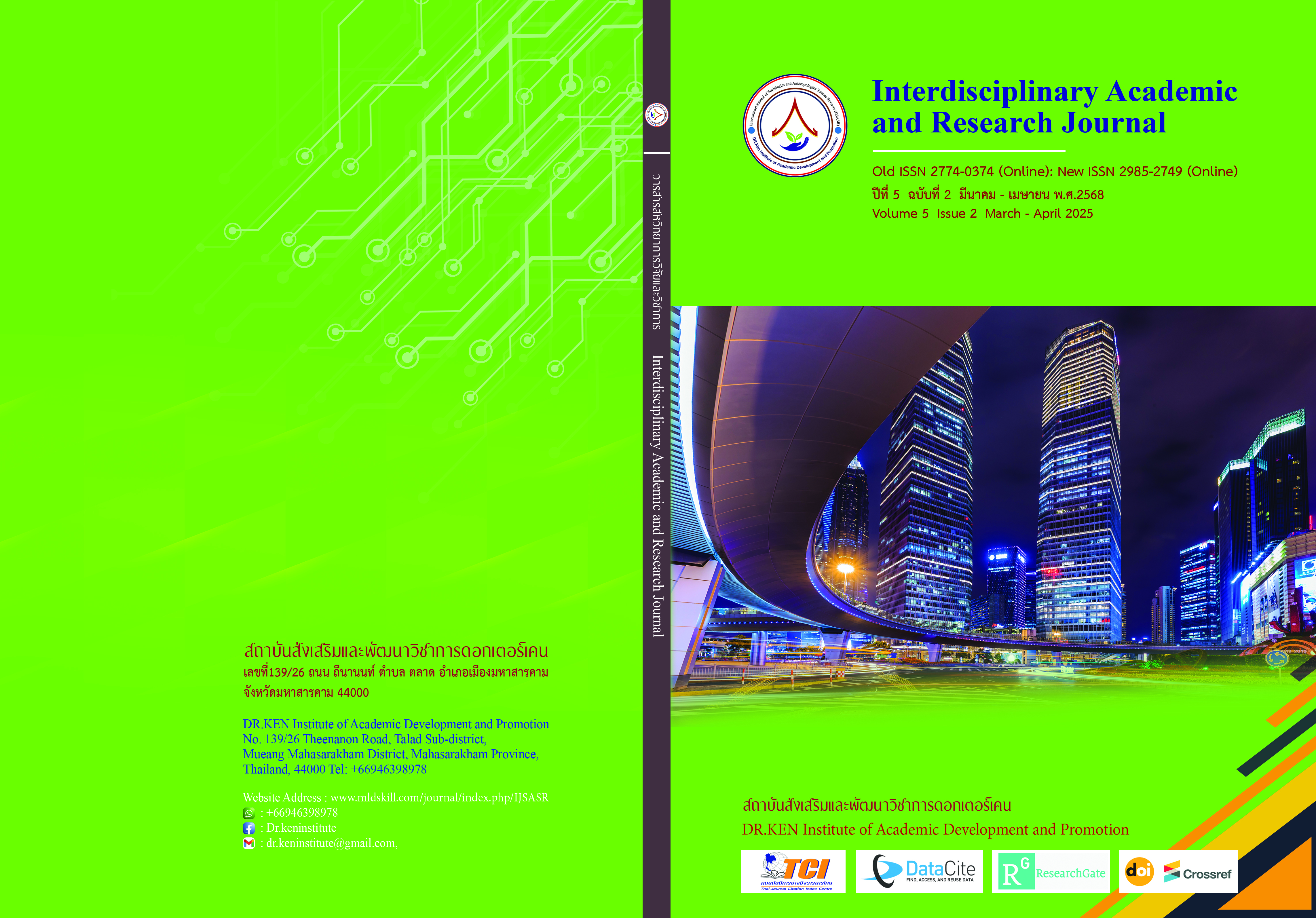Enhancing Research Skills and Perceptions of Pre-Service English Teachers through Blended Learning and Collaborative Action Research
DOI:
https://doi.org/10.60027/iarj.2025.281717Keywords:
Blended Learning, Collaborative Action Research, Research Skills, English TeachersAbstract
Background and Aims: Experience in collaborative action research is crucial for developing research skills among pre-service English teachers. This research aimed to: 1) study the research skills of pre-service English teachers during their participation in a blended learning program, and 2) investigate their opinions about collaborative action research before and after participating in the blended learning program.
Methodology: This mixed-method research included both quantitative and qualitative approaches. Quantitative data was used to study the research skills of pre-service English teachers during the blended learning program and compare their opinions on collaborative action research before and after the program. Qualitative data were gathered to explore additional insights and suggestions regarding collaborative action research and the blended learning program. The target group consisted of 45 undergraduate students majoring in English (Bachelor of Education), enrolled in course 1553801, English Language Teaching Research, in the academic year 2023. They were selected using purposive sampling as students taught by the researcher. Research tools included: 1) the blended learning program, 2) the research skills assessment, 3) pre- and post-program questionnaires on collaborative action research, and 4) open-ended questionnaires for additional opinions and suggestions. Quantitative data were collected and analyzed using frequency, percentage, mean, standard deviation, and mean difference. Qualitative data were collected and analyzed using content analysis.
Results: 1) All student research groups passed the required level of research skills after completing the blended learning program, with most groups rated as "satisfactory." Among the components, research design skills were rated the highest, while data collection and data interpretation skills were rated the lowest. 2) Students' opinions on collaborative action research significantly improved after completing the program, with the most significant change in their knowledge of collaborative action research, and the least change in the aspect of support and assistance. 3) Students recognized the importance of using technology throughout the research process, identified collaboration among group members as a key factor in research success, and found blended learning to be an appropriate learning model aligned with both learners' needs and current situations.
Conclusion: The blended learning program enhanced students' research skills, led to positive changes in their perceptions of collaborative action research, and raised awareness of the importance of technology integration and collaborative learning.
References
กุลธิดา ทุ่งคาใน. (2564).การเรียนรู้แบบผสมผสาน Blended Learning ในวิถี New Normal. ครุศาสตร์สาร. 15 (1),29-43.
พัชราภรณ์ พิลาสมบัติ และดวงกมล จงเจริญ. (2565). ทักษะการวิจัยของครูนักวิจัยเพื่อพัฒนาการจัดการเรียนการสอน. วารสารนวัตกรรมและการจัดการ. 7(1), 166-178.
สมใจ จันทร์เต็ม. (2553). การพัฒนารูปแบบการเรียนการสอนแบบผสมผสาน รายวิชาคอมพิวเตอร์เบื้องต้นสำหรับนักศึกษาระดับปริญญาตรี (ปริญญานิพนธ์ปริญญาดุษฎีบัณฑิต). กรุงเทพฯ: มหาวิทยาลัยเทคโนโลยีพระจอมเกล้าพระนครเหนือ.
สมบูรณ์ กลางมณี. (2554). การพัฒนาหลักสูตรฝึกอบรมครูภาษาอังกฤษระดับมัธยมศึกษาโดยใช้แนวคิดเชิงประสบการณ์ (สารนิพนธ์ปริญญามหาบัณฑิต). อุบลราชธานี : มหาวิทยาลัยการจัดการและเทคโนโลยีอีสเทิร์น
สุวิมล ติรกานันท์. (2551).ระเบียบวิธีการวิจัยทางสังคมศาสตร์: แนวทางสู่การปฏิบัติ. พิมพ์ครั้งที่ 7. กรุงเทพมหานคร: โรงพิมพ์แห่งจุฬาลงกรณ์มหาวิทยาลัย.
องอาจ นัยพัฒน์.(2551).การออกแบบการวิจัย:วิธีการวิจัยเชิงปริมาณและเชิงคณุภาพและผสมผสานวิธีการ.กรุเทพฯ:จุฬาลงกรณ์มหาวิทยาลัย.
Al-Faqi, Abd Alilah Ibrahim. (2011). Blended Learning, the Educational Design- Multi Media-Innovative Thinking. Amman: House of Culture for Publication and Distribution.
Allen, I.E., & Seaman, J. (2010). Learning on Demand: Online Education in the United States, 2009. Sloan Consortium. PO Box 1238, Newburyport, MA 01950.
Chaowatthanakun, K. (2010). The development of a mentoring model for enhancing competency in teaching and conducting classroom action research for pre-service mathematics teachers. Thesis of the Degree of Doctor of Philosophy in Curriculum and Instruction. Bangkok: Silpakorn University.
Creswell, J. W. (2002). Educational research: Planning, conducting, and evaluating quantitative and Qualitative research. Upper Saddle River, New Jersey: Merrill Prentice Hall.
Deshler, D., & Ewert, M. (1995). Participatory action research: Traditions and major assumptions. New York: Ithaca.
Freihat, E.A. (2004). BlendedLearning, Training and Technicality Journal, 62,36-42.
Graham. C.R. (2012). Introduction to Blended Learning. Retrieved from: http://www.media.wiley.com/product_data/except/86/C.pdf.
Hasan, I.M.. (2010). Blended Learning. Published Article, E-Learning Magazine, Al-Mansoura University, 5, 10-11.
Horn, B. M., & Staker, H. (2011). The Rise of K-12 Blended Learning. Unpublished Paper.: Innosight Institute.
Ismail, Al-Gharib Zaher. (2009). E-Learning from Application to Professionalism. Cairo: Alam Al-Kutob (the world of books).
Kember, Devid; & Leung, L.P.Doris. (2005). The influence of active learning experiences on the development of graduate capabilities. Study in Higher Education. 30(2), 155-170.
Kemmis, S., & McTaggart, R. (1988). The Action Research Planer. 3rd edition. Victoria : Deakin University
Salameh, H.A. (2005). Blended Learning the Natural Development of E-Learning. A Paper Presented at the South Valley University, College of Education in Sohaj.
Stringer, E. (1999). Action Research. 2nd Edition, SAGE Publications, Thousand Oaks.
Tawil, H. (2018). The Blended Learning Approach and Its Application in Language Teaching. International Journal of Language and Linguistics, 5(4), 47-53.
Walter, M. (2009). Participatory Action Research. Social Research Methods. In A. Bryman (Ed.), Social Research Methods. London: The Falmer Press.
Webb, F., Smith, C., & Worsfold, K. (2011). Research Skills Toolkit. Retrieved 10 December 2021, from: http://www.griffith.edu.au/gihe/resources-support/graduate-Attributes
Downloads
Published
How to Cite
Issue
Section
License
Copyright (c) 2025 Interdisciplinary Academic and Research Journal

This work is licensed under a Creative Commons Attribution-NonCommercial-NoDerivatives 4.0 International License.
Copyright on any article in the Interdisciplinary Academic and Research Journal is retained by the author(s) under the under the Creative Commons Attribution-NonCommercial-NoDerivatives 4.0 International License. Permission to use text, content, images, etc. of publication. Any user to read, download, copy, distribute, print, search, or link to the full texts of articles, crawl them for indexing, pass them as data to software, or use them for any other lawful purpose. But do not use it for commercial use or with the intent to benefit any business.
















.png)


